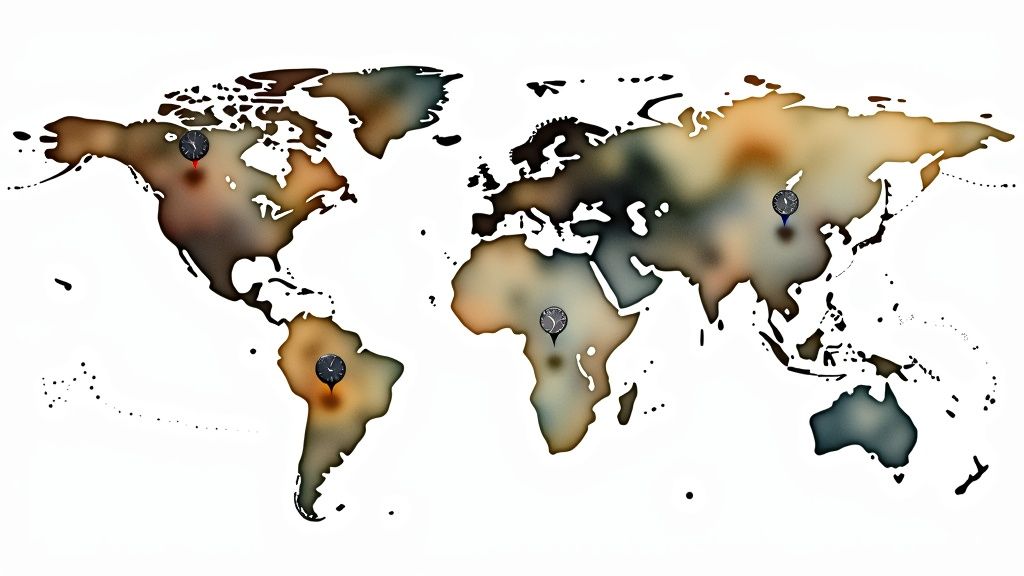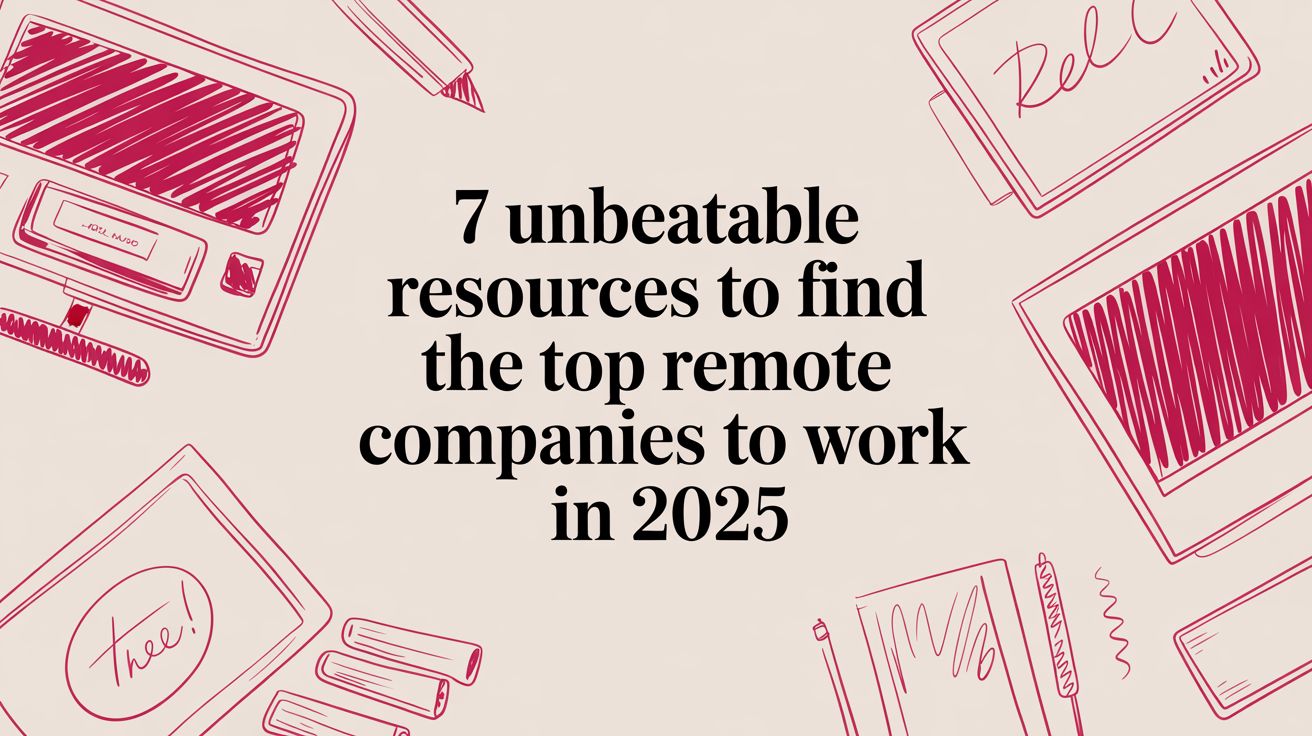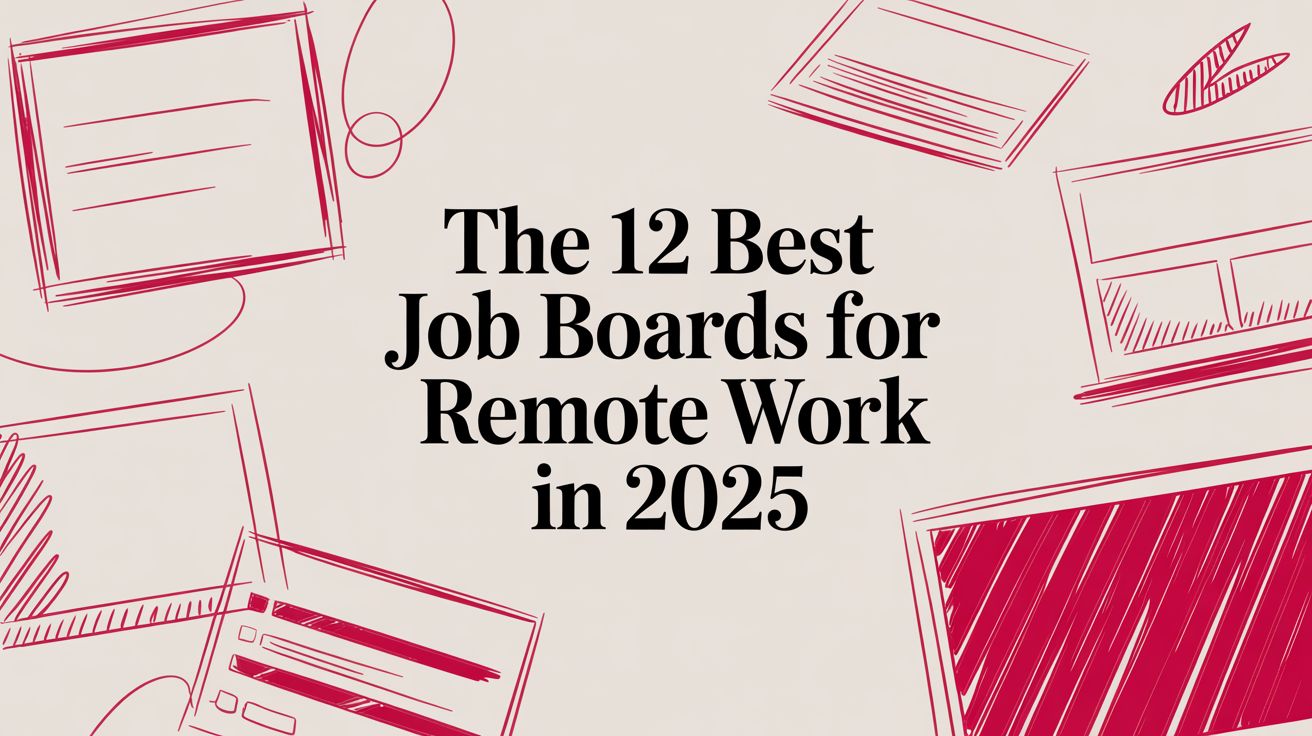Unlocking Remote Work Success: Your Guide to Interview Questions
Landing a remote job requires demonstrating your ability to excel in a virtual environment. This guide tackles the 7 most common remote job interview questions, providing sample answers, preparation tips, and real-world examples. With the increasing prevalence of remote work opportunities, understanding these questions is key to presenting yourself as the ideal candidate.
This curated list dives into specific questions employers use to assess your remote work capabilities. You’ll learn how to effectively answer questions about your home office setup, communication strategies across time zones, project management in remote settings, self-motivation techniques, proficiency with collaboration tools, relationship building in virtual teams, and independent time management.
To better understand how candidates handle different workplace scenarios, consider incorporating behavioral interview questions into your process. This resource from X0PA Ai offers nine valuable behavioral interview questions you should know. Mastering these key remote job interview questions is essential for navigating the interview process and securing your desired remote position. This guide offers practical insights to help you showcase your skills and experience effectively. We’ll cover essential topics like communication, time management, and tech proficiency, providing you with the tools to ace your next remote interview. Preparing for these questions will not only help you impress potential employers but also ensure you’re truly ready to thrive in a remote role.
1. What is your home office setup and how do you maintain productivity while working from home?
This foundational remote job interview question assesses a candidate’s preparedness for remote work. Interviewers use it to evaluate not just the physical workspace and equipment, but also the candidate’s self-management strategies. It offers a glimpse into their understanding of the necessary infrastructure for effective remote work and their ability to create boundaries between their personal and professional life. This question goes beyond simply having a desk and chair; it delves into the candidate’s ability to thrive in a distributed work environment.

Companies like GitLab, Buffer, and Automattic have integrated workspace assessments into their remote hiring processes, recognizing the critical link between a functional home office and productivity. They understand that a candidate’s ability to create a productive workspace directly impacts their performance and overall success in a remote role. This isn’t just about ticking boxes; it’s about ensuring the candidate is equipped to contribute effectively to a distributed team. For more information on how to successfully work from home, check out this article: How To Successfully Work From Home.
Examples in Practice
- GitLab: Asks candidates to describe their ideal workspace during interviews.
- Buffer: Evaluates home office ergonomics as part of their remote hiring process.
- Automattic: Includes workspace assessment in their distributed team onboarding.
Tips for Interviewers
- Dig Deeper: Don’t just settle for surface-level answers. Ask specific questions about internet speed, backup plans, and noise management strategies. Inquire about their daily routine and how they maintain boundaries between work and personal life.
- Focus on Adaptability: A perfect current setup isn’t always necessary. Look for candidates who demonstrate adaptability and a willingness to optimize their workspace. Someone who can problem-solve and adjust to different situations is a valuable asset in a remote environment.
- Level the Playing Field: Consider offering equipment stipends to ensure all candidates have access to the tools they need for success, promoting equity and fairness in the hiring process.
- Daily Structure: Explore how candidates structure their day, prioritize tasks, and minimize distractions. This reveals their self-management skills and ability to maintain focus in a remote setting.
Why this Question Matters
This question allows you to gauge a candidate’s understanding of the practicalities of remote work. It also provides insight into their organizational skills, self-discipline, and ability to proactively address potential challenges. Understanding how a candidate approaches these crucial aspects of remote work can significantly impact your hiring decision. Learn more about setting up an ergonomic home office. This is crucial for long-term comfort and productivity when working remotely.
2. How do you handle communication and collaboration when working with team members across different time zones?
This critical remote job interview question probes a candidate’s ability to navigate the complexities of global teamwork. Interviewers use it to assess not only their communication skills but also their understanding of asynchronous work and their strategies for maintaining team cohesion across geographical distances. It offers insight into how effectively they can contribute to a distributed team operating across multiple time zones.

Companies like Shopify and Zapier, pioneers in remote work, prioritize effective cross-time zone communication. They recognize that clear communication protocols and asynchronous workflows are essential for a distributed team’s success. These companies understand that successful collaboration isn’t just about frequent meetings; it’s about ensuring information flows efficiently across different time zones. For more insight, Learn more about working effectively with international remote teams.
Examples in Practice
- Shopify: Utilizes structured handoff processes to ensure seamless collaboration between teams in different time zones.
- Zapier: Implements clear “communication protocols” that define how and when different communication channels are used for their global workforce.
- InVision: Conducts asynchronous design reviews, allowing international design team members to provide feedback at their convenience.
Tips for Interviewers
- Explore Tools and Methods: Ask about specific tools and platforms they’ve used successfully for communication and collaboration across time zones.
- Handle Urgent Communications: Inquire about their approach to handling urgent communications or time-sensitive issues across different time zones.
- Inclusive Meeting Scheduling: Discuss their strategies for inclusive meeting scheduling, considering the availability of team members in various locations.
- Building Relationships: Explore how they approach building rapport and maintaining strong working relationships with colleagues they may rarely interact with face-to-face.
Why this Question Matters
Understanding how a candidate handles the nuances of global collaboration is crucial in a remote work setting. This question provides valuable insight into their communication skills, adaptability, and their ability to contribute effectively to a distributed team. It also reveals their understanding of the unique challenges and opportunities presented by working across different time zones.
3. Describe a time when you had to manage a project or deadline entirely remotely. What challenges did you face and how did you overcome them?
This behavioral interview question delves into a candidate’s practical experience with remote project management. Using the STAR method (Situation, Task, Action, Result), interviewers aim to understand how candidates handle the unique obstacles of remote work, such as communication barriers and coordinating resources across different locations. It reveals their problem-solving abilities, resilience, and adaptability in a distributed environment. This question assesses their capacity to not only manage projects remotely but also thrive in doing so.

Companies like HubSpot, Atlassian, and GitHub recognize the importance of proven remote project management experience. HubSpot often incorporates specific remote project examples into their interview process. Atlassian evaluates a candidate’s ability to lead projects in a distributed setting. GitHub assesses experience with collaborative, open-source projects, highlighting the growing need for these skills in remote job interview questions. This reflects the increasing importance of remote collaboration and project management skills in today’s job market.
Examples in Practice
- HubSpot: Asks for specific remote project management examples during interviews.
- Atlassian: Evaluates distributed project leadership capabilities.
- GitHub: Assesses open-source project collaboration experience.
Tips for Interviewers
- Listen for Specifics: Don’t just accept general statements. Probe for specific challenges the candidate faced and the concrete solutions they implemented. This reveals their practical problem-solving skills.
- Follow Up on Lessons Learned: Ask about what they learned from the experience and how they would improve their approach in the future. This demonstrates their capacity for reflection and growth.
- Evaluate Team Contributions: Distinguish between the candidate’s individual contributions and the overall team effort. This provides a clearer picture of their remote leadership abilities.
- Proactive Communication: Look for evidence of proactive communication and stakeholder management. These are crucial for success in remote project management.
Why this Question Matters
This question helps you assess a candidate’s practical experience and ability to navigate the complexities of remote project management. It also provides valuable insights into their problem-solving skills, communication strategies, and resilience in overcoming challenges. By understanding how a candidate has successfully managed remote projects in the past, you can better predict their future performance in a similar role.
4. How do you stay motivated and avoid distractions when working independently without direct supervision?
This question probes the candidate’s self-management abilities, intrinsic motivation, and strategies for maintaining focus in an environment with minimal external accountability. It’s crucial for assessing whether someone can thrive in the autonomy that remote work provides while meeting performance expectations. This question delves into the candidate’s ability to proactively manage their time, prioritize tasks, and maintain productivity without constant oversight. It highlights their understanding of the unique challenges of remote work and their ability to navigate them successfully.

Companies like Basecamp, Help Scout, and ConvertKit recognize the importance of self-motivation in remote roles. They understand that successful remote employees possess strong self-discipline and the ability to stay focused on their goals. These companies often integrate assessments of these qualities into their remote job interview questions. This isn’t merely about independent working; it’s about ensuring the candidate can flourish in a distributed environment. For those struggling with the social isolation aspect of remote work, learn more about coping with remote work loneliness.
Examples in Practice
- Basecamp: Evaluates self-motivation during their remote hiring process.
- Help Scout: Assesses independent work capabilities as a key factor.
- ConvertKit: Includes autonomy assessment in their remote interviews.
Tips for Interviewers
- Ask for Specific Examples: Don’t settle for generic answers. Inquire about specific productivity techniques they use, like time blocking or the Pomodoro method.
- Inquire About Motivation Dips: Explore how they handle motivation dips and difficult days. This reveals their resilience and problem-solving skills.
- Explore Goal Setting: Discuss their methods for setting and tracking personal goals, showcasing their organizational skills.
- Discuss Seeking Help: Explore their approach to seeking help when needed despite working independently, revealing their communication and collaboration skills.
Why this Question Matters
This question helps assess a candidate’s suitability for remote work by understanding their self-motivation and focus strategies. It provides insights into their organizational skills, self-discipline, and ability to overcome challenges independently. This information is essential for making informed hiring decisions for remote positions. Understanding how a candidate navigates the unique demands of remote work is crucial for predicting their long-term success.
5. What tools and technologies are you comfortable using for remote collaboration, and how proficient are you with them?
This technical assessment question evaluates the candidate’s familiarity with the digital infrastructure essential for remote work success. It goes beyond basic tool knowledge to assess their understanding of how different technologies integrate to create effective remote work workflows and their ability to adapt to new platforms. This question reveals whether a candidate can seamlessly integrate into a remote team and contribute effectively from day one. Maintaining focus is crucial. For actionable advice on how to stay focused at work, check out these 8 powerful tips for 2025 from Fluidwave.
Examples in Practice
- Slack: Evaluates proficiency with communication and productivity platforms like Slack Connect and shared channels. They look for candidates who understand how to use these tools effectively for team communication, file sharing, and project management.
- Zoom: Assesses video conferencing and presentation skills during interviews. Proficiency in screen sharing, virtual backgrounds, and managing participant interaction is often evaluated.
- Microsoft Teams-based companies: Test collaboration tool integration knowledge. They look for candidates familiar with integrating apps like Planner, OneNote, and SharePoint for seamless workflow management.
Tips for Interviewers
- Ask about their experience with tool integration and workflow optimization. How do they connect different platforms to streamline their work? This reveals their technical understanding and ability to optimize processes.
- Inquire about their approach to learning new technologies quickly. The remote work landscape is constantly evolving. Candidates who can quickly adapt to new tools are highly valuable.
- Discuss their understanding of security best practices. Data security is paramount in remote work. Assess their knowledge of secure file sharing, password management, and other relevant security measures.
- Explore their ability to train others and provide technical support. A candidate who can help their colleagues navigate technical challenges contributes to a stronger and more supportive remote team.
Why this Question Matters
This question helps you identify candidates who possess the technical skills and adaptability needed to thrive in a remote environment. It also provides insights into their problem-solving abilities, commitment to continuous learning, and potential to contribute to a collaborative remote team culture. Learn more about remote collaboration tools and how they can enhance productivity. This is crucial for seamless communication and project management in a distributed team setting.
6. How do you build and maintain professional relationships with colleagues you may never meet in person?
This question addresses one of the most significant challenges in remote work: creating meaningful professional connections and team cohesion without physical proximity. It evaluates emotional intelligence, communication skills, and a candidate’s understanding of how relationships impact remote team success and career development. Interviewers use this question to assess not only how candidates initiate connections but also how they nurture them over time, contributing to a positive and productive remote work environment. This goes beyond casual interactions; it delves into the candidate’s ability to foster genuine professional bonds in a virtual setting.
Companies like Buffer, GitLab, and Automattic prioritize relationship building in their remote cultures, recognizing the crucial role it plays in team performance and employee satisfaction. They understand that fostering strong connections remotely requires deliberate effort and proactive communication. This isn’t about forced socialization; it’s about creating an environment where colleagues feel connected and supported, leading to improved collaboration and overall team success. Learn more about virtual team-building activities to understand the practical steps companies take to promote these connections.
Examples in Practice
- Buffer: Implements virtual coffee chats and other relationship-building activities. These informal interactions help team members connect on a personal level and build rapport outside of project-related discussions.
- GitLab: Has structured processes for remote relationship building, including dedicated communication channels and team-building exercises. This structured approach ensures that relationship building is integrated into the company’s workflow.
- Automattic: Organizes annual meetups to strengthen remote relationships, providing opportunities for face-to-face interaction and team bonding. These in-person gatherings reinforce virtual connections and build a stronger sense of community.
Tips for Interviewers
- Ask for Specific Examples: Don’t settle for vague answers. Ask candidates to describe specific examples of relationships they’ve built remotely and the steps they took to cultivate those connections.
- Inquire about Informal Communication: Explore their approach to informal communication and team bonding. How do they engage with colleagues outside of formal meetings and project discussions?
- Explore Conflict Resolution Strategies: How do they navigate conflict resolution in remote settings? Effective communication and interpersonal skills are crucial for resolving disagreements in a virtual environment.
- Discuss Celebrating Successes: Discuss their methods for celebrating team successes and supporting colleagues remotely. This reveals their understanding of the importance of recognizing achievements and fostering a positive team spirit.
Why this Question Matters
This question allows you to assess a candidate’s ability to thrive in a distributed team environment. It also provides insight into their communication style, emotional intelligence, and understanding of the nuances of remote team dynamics. Understanding how a candidate approaches building and maintaining relationships remotely can significantly impact their success within your team.
7. Describe your experience with managing your own schedule and meeting deadlines without external reminders or check-ins
This crucial remote job interview question assesses a candidate’s time management skills, self-accountability, and ability to thrive in low-supervision environments. Interviewers use it to evaluate not just the candidate’s organizational abilities, but also their proactive approach to managing their workload and meeting deadlines independently. This question delves into a candidate’s self-discipline and their understanding of the importance of self-management in a remote setting where direct oversight is limited.
Companies like Todoist, various remote agencies, and freelance platforms like Upwork prioritize candidates who demonstrate strong self-management skills. They recognize that in a distributed work environment, individual accountability directly impacts team productivity and project success. This isn’t just about meeting individual deadlines; it’s about contributing reliably to a team that often works asynchronously.
Examples in Practice
- Todoist: Evaluates a candidate’s personal productivity methodology during interviews, looking for structured approaches to task management.
- Remote Agencies: Assess deadline management within the context of project-based work, often using past project examples as case studies.
- Upwork: Emphasizes the importance of timeline reliability, as freelancers on the platform are often managing multiple projects simultaneously.
Tips for Interviewers
- Ask for Specifics: Don’t settle for vague answers. Inquire about specific examples of complex projects they’ve managed independently, prompting them to detail their process.
- Explore their Methodology: Inquire about their methods for breaking down large projects into manageable tasks and how they prioritize competing demands.
- Assess Adaptability: Explore their approach to handling unexpected changes or shifting priorities, gauging their flexibility and problem-solving skills.
- Communication is Key: Discuss their communication style when deadlines become challenging, emphasizing the importance of proactive updates in remote settings.
Why this Question Matters
This question allows you to gauge a candidate’s understanding of the self-directed nature of remote work. It also provides insights into their organizational skills, proactive communication style, and their ability to manage their time effectively without constant supervision. Understanding how a candidate approaches these fundamental aspects of remote work can significantly influence your hiring decision. This is paramount for ensuring productivity and successful project completion in a distributed team.
7 Key Remote Interview Question Comparison
| Question Topic | Implementation Complexity 🔄 | Resource Requirements ⚡ | Expected Outcomes 📊 | Ideal Use Cases 💡 | Key Advantages ⭐ |
|---|---|---|---|---|---|
| What is your home office setup and how do you maintain productivity while working from home? | Moderate - involves evaluating multiple factors | Medium - requires candidate’s equipment and space | Insight into candidate’s readiness and self-management; predicts technical ease of remote work | Remote roles needing self-managed workspace and technical readiness | Identifies proactive candidates; assesses ergonomic and productivity awareness |
| How do you handle communication and collaboration when working with team members across time zones? | High - requires understanding asynchronous workflows | Medium - depends on candidate’s experience with tools | Demonstrates ability to manage global collaboration and cultural sensitivity | Distributed teams across multiple regions | Reveals strong planning and adaptability; identifies well-organized communicators |
| Describe a time when you had to manage a project or deadline entirely remotely. | High - behavioral and situational complexity | Low to Medium - based on candidate’s experience | Provides concrete evidence of remote project management skills and resilience | Roles requiring leadership and remote project management | Shows problem-solving, ownership, and adaptability under pressure |
| How do you stay motivated and avoid distractions when working independently without direct supervision? | Moderate - introspective and behavioral focus | Low - relies on candidate’s personal strategies | Assesses intrinsic motivation and focus maintenance in autonomy | Independent roles needing strong self-discipline | Identifies self-starters; reveals honest productivity systems |
| What tools and technologies are you comfortable using for remote collaboration, and how proficient are you with them? | Moderate - technical knowledge required | Medium to High - depends on tool proficiency level | Evaluates technical adaptability and digital workflow optimization | Tech-heavy remote positions and fast onboarding | Indicates readiness to work with existing tools; shows troubleshooting and security awareness |
| How do you build and maintain professional relationships with colleagues you may never meet in person? | Moderate - soft skills and emotional intelligence | Low - based on communication habits and creativity | Reveals ability to foster remote team cohesion and long-term relationship building | Remote teams emphasizing culture and collaboration | Identifies candidates contributing positively to team dynamics and culture |
| Describe your experience with managing your own schedule and meeting deadlines without external reminders or check-ins | Moderate - behavioral and organizational focus | Low - self-management based | Measures time management, accountability, and prioritization skills | Freelance, remote roles with minimal supervision | Demonstrates reliability and mature ownership of tasks |
Landing Your Dream Remote Role: Next Steps
Mastering remote job interview questions is crucial for anyone seeking a flexible and fulfilling career. This guide has provided a comprehensive overview of common questions, offering insights into what hiring managers look for and how to craft compelling answers. By understanding the nuances of remote work communication, collaboration, and time management, you can position yourself as a strong candidate in today’s competitive job market. Let’s recap some of the essential takeaways:
Key Takeaways for Remote Interview Success
- Showcase your remote work setup: Detail your dedicated workspace and strategies for maintaining productivity, emphasizing your proactive approach to minimizing distractions.
- Highlight your communication skills: Demonstrate your ability to communicate effectively across time zones and utilize various communication tools. Clearly articulate your methods for staying connected with colleagues and maintaining a sense of community.
- Emphasize your project management skills: Provide specific examples of successfully managing remote projects, outlining your problem-solving abilities and adaptability in overcoming challenges.
- Demonstrate self-motivation and discipline: Show your ability to manage your time effectively, meet deadlines independently, and stay focused without direct supervision.
- Showcase your tech proficiency: Be prepared to discuss your experience with remote collaboration tools and technologies. Highlight your adaptability and willingness to learn new platforms.
- Building virtual relationships: Articulate your approach to building strong professional relationships in a remote environment, emphasizing your ability to foster connections and collaboration.
Preparing for Your Remote Future
By internalizing these insights and practicing your responses, you can confidently address remote job interview questions and make a lasting impression. Remember, preparation is key. Practice your answers out loud, consider potential follow-up questions, and tailor your responses to each specific role and company. The ability to thrive in a remote environment is increasingly valuable, and by demonstrating your preparedness, you can significantly increase your chances of landing your dream remote job.
Your Next Step: Explore Remote Opportunities
Now that you’re equipped with the knowledge to ace your remote interviews, it’s time to take the next step in your job search. Explore the diverse listings on Remote First Jobs, a platform specifically designed to connect remote job seekers with companies embracing remote work. Find your perfect fit and launch your fulfilling remote career today.






